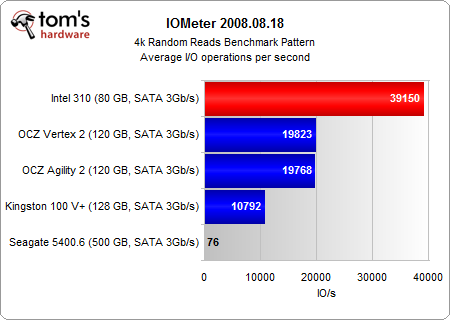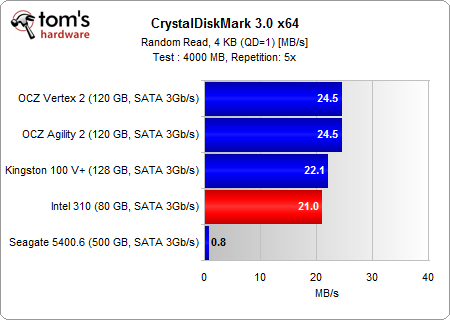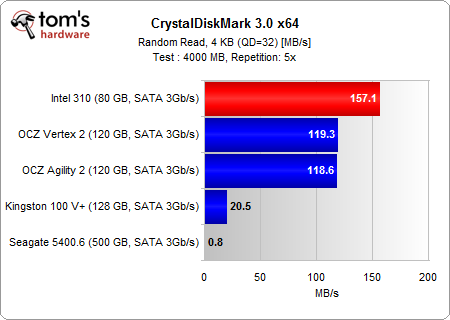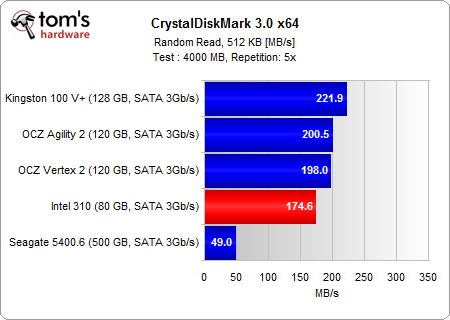Benchmark Results: 4 KB And 512 KB Random Reads
Testing random read and write speed is perhaps most important for desktop usage models. Unless you’re doing heavy video editing, you’re probably not reading or writing a ton of sequential data to an SSD, after all.
Intel pulls far ahead in Iometer's 4 KB random read performance, while the Agility 2 and Vertex 2 match one another. Seagate's Momentus 5400.6 falls into last place here.
The header of these two charts is the same, except for one important detail. The first employs a queue depth of one, and the second uses a queue depth of 32. Why are these figures important? Well, look what they do to performance.
Native Command Queuing, part of the SATA specification, was originally designed to improve the performance of mechanical disks by allowing the hard drive itself to optimize the order in which read and write commands get executed. Of course, the physics of a hard drive don’t apply to SSDs. However, the multi-channel architecture of a solid state drive enables it to similarly field multiple concurrent requests—though Intel claims the bottleneck isn’t the drive, but rather the host system itself. Today’s SSDs are consequently dependent on high queue depths in order to realize the specifications you see manufacturers quoting.
With a QD of one, it's easy to see how reliant Intel's architecture is on concurrent requests, as both the SandForce- and Toshiba-based drives outperform the SSD 310. Cranking queue depth up to the other (very unrealistic on the desktop and even more so in a mobile environment) extreme queue depth of 32, Intel's 310 is suddenly pushing 157 MB/s, passing its competition by a notable margin. That's incredibly optimistic, though, especially for a product designed to address embedded and netbook markets.
Get Tom's Hardware's best news and in-depth reviews, straight to your inbox.
Current page: Benchmark Results: 4 KB And 512 KB Random Reads
Prev Page Benchmark Results: CrystalDiskMark Streaming Performance Next Page Benchmark Results: 4 KB And 512 KB Random Writes-
Annisman Great article!Reply
Been rocking an SSD for about a year now, and there is no going back to mechanical drives, SSD for the laptop segment makes even more sense. I think most of us however would like to see price drops a bit faster though, my 120GB OCZ Vertex Turbo cost me over 500 dollars. -
acku Reply9509117 said:Great article!
Been rocking an SSD for about a year now, and there is no going back to mechanical drives, SSD for the laptop segment makes even more sense. I think most of us however would like to see price drops a bit faster though, my 120GB OCZ Vertex Turbo cost me over 500 dollars.
I believe the last report I read mentioned close to 60% of all SSD purchases are mobile related. SSDs can really mark up a notebook's price, so I'm right there with you on prices. We need price drops, more of them, and in quicker succession.
Cheers,
Andrew Ku
TomsHardware.com -
alyoshka It's high time they came up with the ROM or CMOS chip that has the capacity to just store the OS on it and a few other programs, that itself will make the system really very fast..... then they could go over for a change to the 6GBps SATA drives and make them work at that speed..... Really, we already have ample RAM and expandable slots for them, why not get a little more creative and just get the job done instead of going all the way round and trying this approach.Reply
We have fast, extremely fast drives but at prices that touch the sky, wouldn't it be better to just have loaded or embedded the OS straight onto the mobo.... cheaper until it's capable of handling the high data flow rates offered by SSD... yet not being able to saturate the SATA flow rates or capacities..... -
amk09 Newegg Daily Shell Shocker has a 128GB Kingston SSD on sale for $119.99!!!!!!!!!!!!!!!!!!!!!!!!!!!!!!!!!!!!!Reply
History has been made. SSD's are finally starting to hit a dollar/GB. Keep those prices dropping! -
druids84 Although I of course would enjoy having 120+GB SSD on my laptop or home desktop, only true photo/video professionals or gamers with ample games need that much fast storage! I am able to squeeze Win7 and several Valve games within my old 30GB OCZ Vertex SSD, and I would feel quite comfortably with having 64GB SSD just to have more breathing space. You do NOT need more than that unless you're processing a lot of photos/videos. 120+GB is only if you include movies and music. You don't need 20,000 IOPs or 250MB/s seq.reads for your movies and other sitting junk! ;) Just buy a cheap external 2.5" HDD and store all your movies/music/photos on that, and this solution is quite mobile if you drag your laptop everywhere!Reply -
Travis Beane druids84Although I of course would enjoy having 120+GB SSD on my laptop or home desktop, only true photo/video professionals or gamers with ample games need that much fast storage! I am able to squeeze Win7 and several Valve games within my old 30GB OCZ Vertex SSD, and I would feel quite comfortably with having 64GB SSD just to have more breathing space. You do NOT need more than that unless you're processing a lot of photos/videos. 120+GB is only if you include movies and music. You don't need 20,000 IOPs or 250MB/s seq.reads for your movies and other sitting junk! Just buy a cheap external 2.5" HDD and store all your movies/music/photos on that, and this solution is quite mobile if you drag your laptop everywhere!My Steam folder alone is 437GB. I have another 100GB+ on non steam games also. Then add my OS and etc.Reply
I currently enjoy the faster speeds of 4x500 RAID 0 with the OS on a 1TB. I would actually be running 8x500GB RAID 0 if my case was large enough, and my graphics card weren't so large (blocks 2 slots).
How does Toms feel about doing a showdown between $500 of modern HDD vs $500 of modern SSD? With and without a dedicated controller.
I know for my next build I don't know whether I want 4x 3TB or a 3TB with 2-3x SSD or 3x 3TB with a single small SSD, or is it better to go with, say, 8x 1TB or 4x 3TB in either RAID 0, 10, 5, 6, 50, 60 etc. :) -
druids84 Well, just as I mentioned earlier, my point still holds: you DON'T need more than 120+GB unless you're serious gamer or professional working in multimedia business. And your setup sounds a bit like "gamer with ample games" case from my argument. ;) I really can't see a way I could squeeze 4x RAID in ordinary non-gaming laptop, which is what many if not most of people use for actually doing their work.Reply
So, if I would have to choose between old-school 500GB HDD, overkill 256GB SSD, or just simple 60-128GB SSD + external 2.5" HDD for a laptop, I'd go with the last one. -
romulous75 meh, when I added an SSD drive I did not notice much improvement. I have a raid 5 array of WD2003FYYS drives which use to be the boot drive ;)Reply -
romulous75 oh, and also I seem to be the first one loaded in COD black ops when it changes levels :)Reply



